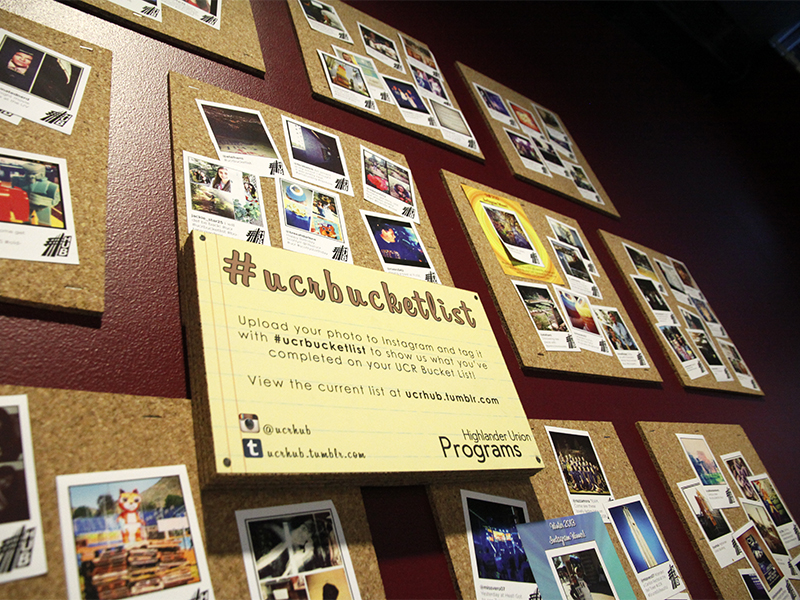
“Before I die I want to go to Thailand,” writes one of many anonymous contributors to the trending “Before I die …” chalkboards. “Before I want to die, I want to help the world,” writes another.
The project began on an abandoned house in New Orleans. The boards feature the words “Before I die” with a blank space printed multiple times. Now, throughout numerous American cities, stenciled boards are being placed in public areas with the hope of inspiring individuals to express their life aspirations. Recently, one was placed on a wooden fence along a street in Los Angeles, Calif. This exhibition of goals and desires in a public setting encourages personal well-being, self-reflection and a sense of community. UCR should partake in the chalkboard project in order to extend and benefit from this positive experience.
Research shows that bucket lists can be psychologically beneficial. Dr. Laura A. King’s study from Southern Methodist University shows that “writing about life goals [is] … associated with a significant increase in subjective well-being.” Students can use the benefits of expressing life-goals to their advantage, especially to combat the stress of coursework and extracurricular activities.
Every day, we face large amounts of homework and endless hours of studying, along with club meetings, social gatherings and family phone calls. Writing down a goal, even abstract, would allow us to momentarily break from our busy routines. UCR currently offers a variety of psychologically beneficial activities such as Therapy Fluffies and Mid-Term Nap Sessions. Bucket list chalkboards would be a psychologically-proven and fitting addition to the current effort to relieve stress on campus.
Chalkboard bucket lists can suit university students in general. At the beginning of adulthood, we face a point in which we ask ourselves, “What am I going to do in life?” Everybody has different answers. The chalkboards encourage individuals to reflect on their life in order to decide what is still missing. Even those who have chosen their majors and ideal career paths can inquire about other types of goals. One participating individual says, “Before I die I want to be an actress, a good one.” Another participant writes, “Before I die I want to do things for me and not to please everybody else.” Goals can extend beyond academic accomplishments—they can reflect a person’s sociological dissatisfaction and motivate them to improve relationships and friendships. These ideas are entirely appropriate for UCR students to consider.
The “Before I die …” project can generate a feeling of community. Currently, 69 percent of UCR students are commuters—a perceived contributor to the lack of school spirit. In addition, students, as well as most people, tend to gravitate to groups where they feel comfortable rather than spark conversation with strangers. Placing these chalkboards on campus would provide us with a sense of unity because it would remind us about what we have in common and what is unique about each of us without directly asking students to converse.
Learning these aspects of each other can allow us to empathize with our peers. When connections are made, people can find comfort and enjoyment in participating in activities and attending events, rather than being confined by their familiar group of friends. Faculty and staff may also participate to make the impact more substantial. Overall, this would allow us insight into each other’s hopes and desires. It is not limited to extroverted individuals in the way common social activities are. Expression can be used as a tool for unity in a detached campus. Community chalkboards allow this possibility.
The idea of chalkboard bucket lists should not to be confused with #ucrbucketlist, a current means of motivating students to complete school activities featured on Instagram. These bucket lists would reflect personal goals. Although #ucrbucketlist’s intention of bringing students out of their shells has been successful, free-response bucket lists would enable students to benefit on a deeper level by promoting self-expression and well-being. They would allow individual voices to be heard, while #ucrbucketlist has no capacity for collective dialogue. The chalkboard concept complements the existing “to-do” lists of students, making it a considerable addition.
From simple hobbies we want to try to decisions that can change our lives, each post allows us to better our attitudes, motivation and knowledge of our fellow students. Each of these endeavors is perfect for college students in the midst of stress, uncertainty and a fragmented student body. The “Before I die …” chalkboards are a positive tool that enhance the lives of students here at UCR, and are easy to create and do not require much space. UCR should consider adding this interactive art project to our campus.








